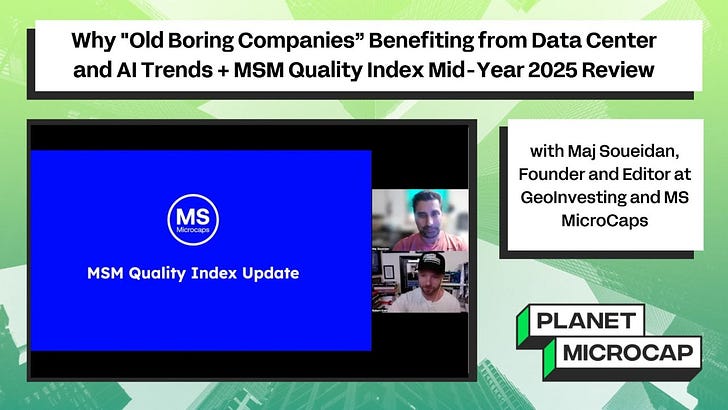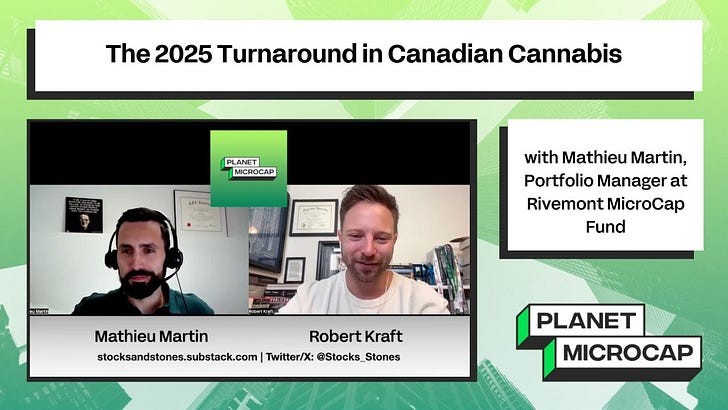To celebrate 10 years since the launch of the Planet MicroCap Podcast, I’m going back through our archives to share with you episodes of the podcast that either: garnered the most downloads/views in our history, stood out to me for the subject matter, the first appearances of regulars and/or that I think you’d really appreciate either re-visiting or for some of you, hearing/watching for the first time.
For this episode of Planet MicroCap Podcast, I spoke with Meredith Brill, who goes by the handle @LockStockBarrl on Twitter and the MicroCapClub.com. We were introduced through a mutual friend, and as you will hear, we discuss how she has been able to leverage her professional skills to help her develop an investing thesis on a potential investment, and to assess her current portfolio. The goal for this episode is to understand that your professional skills can be quite useful when you’re developing your MicroCap investing strategy.
Watch on YouTube:
Summary below:
I. Meredith Brill's Background and Entry into Microcap Investing
Unusual Background:
Meredith Brill has a diverse professional background. She initially studied chemical engineering at the University of Toronto, then earned a law degree at Osgoode Hall. She practiced intellectual property law in Toronto for many years, focusing on patents.
Shift to Investing:
After stepping away from law to become a full-time stay-at-home mother to her three daughters, she began dedicating her time to reading and learning about individual stock picking. She learned through “trial and error,” experiencing both “great successes and some epic failures.”
Discovery of Microcaps:
Her introduction to microcap stocks happened by chance. She had invested in a larger pharmaceutical company, Paladin Labs, and in 2014 came across a news release from a company with a similar business model—but with a market cap of only around $50 million.
Direct Engagement:
Despite her initial hesitation around “penny stocks,” she was surprised by the level of access:
“I was amazed that I was able to pick up the phone, call the CEO, have a great discussion with him.”
That direct engagement was a key differentiator and drew her into the microcap space.
II. Why Focus on Microcaps?
Market Inefficiencies:
Brill recognized that microcaps—being relatively illiquid, under-covered by analysts, and too small for institutional investors—offered significant inefficiencies.
Opportunity for Alpha:
“If you're willing to do the work and try to identify those really high-quality businesses, I think you can really do well.”
Investment Strategy:
She looks for companies that can grow earnings per share and are relatively unknown—allowing her to buy at a low valuation with potential upside from both earnings growth and multiple expansion.
MicroCapClub:
Her research led her to MicroCapClub, a closed online community that shares research on North American microcaps. She became the first woman admitted after submitting a successful stock thesis.
III. Women in Microcap Investing
Lack of Representation:
Brill acknowledges the limited number of women in microcap investing but doesn’t offer a specific theory as to why.
Welcoming Community:
She praises the MicroCapClub community for being welcoming and supportive, helping her grow as an investor.
Networking Value:
Conferences like the Detroit MicroCapClub event were valuable for networking, meeting fellow members, and engaging with management teams.
“Face-to-face is different than a phone call.”
Message to Women:
She encourages more women to get involved:
“Become actively involved in the community—that's the best way to really ensconce yourself in it.”
“It’s not a boys' club at all... it’s a space that you can really excel at if you work really hard.”
IV. Investment Philosophy and Idea Generation
Sector Focus:
With her background in science and patent law, Brill is naturally drawn to growth companies in technology, healthcare, and occasionally the consumer sector.
Key Investment Criteria:
Profitability: She looks for profitable companies.
Scalability: A “key word” for her—she seeks companies with excellent reinvestment opportunities at high rates of return.
Platform Companies: She favors businesses with distribution networks that can launch new products to existing customers with minimal marketing costs (e.g., specialty pharmaceutical companies with established salesforces).
Roll-ups/Consolidation: She’s interested in companies rolling up fragmented industries to realize synergies and gain scale.
Overarching Theme:
“Profitable growth.”
Idea Generation Sources:
A close circle of trusted investing friends.
Online communities like MicroCapClub and Value Investors Club.
Microcap conferences, particularly for one-on-one meetings with management teams.
She notes that even with a compelling story, she might pass on a company if the management doesn’t leave a good impression.
“Sometimes you just don’t like them.”
Growth vs. Value:
“Growth means lots of opportunity for the company to continue to scale... not just a good little business that throws off cash, but you can’t expand it.”
She prefers businesses that continually reinvent themselves and introduce new products and services.
V. Due Diligence Process and Professional Skill Application
Quantitative Due Diligence (Initial Screen):
ROIC / ROE:
“A very key point”—she looks for strong returns, ideally with little to no leverage.
Moat / Competitive Advantage:
She seeks companies with differentiated products or services that can’t be easily disrupted.Valuation:
She uses P/E and P/B ratios but insists on a holistic view.IP / Patents:
Her legal background draws her to companies with strong, commercially viable IP—not just those “waving around patents” for PR.
Qualitative Due Diligence (After the Screen):
FinTwit:
She uses Twitter (@lockstockbarrel) to “data mine,” track $[ticker] hashtags, and find relevant blogs or sentiment.Low Visibility = Opportunity:
“I get pretty excited to see little to no activity on the stock. No one’s talking about it... that implies it’s relatively undiscovered and trading at a good low valuation.”
Case Study – Patent Infringement Lawsuit:
Context: A microcap company she held was hit with a patent lawsuit. Most investors saw it as a binary risk and dumped the stock.
Opportunity:
“I saw it as an opportunity to use my specific science and patent law skills to assess the merits... and assign probabilities to outcomes.”
Her Process Included:
Infringement: She evaluated whether the product actually infringed the patent, sending samples to labs for analysis.
Validity: She reviewed the patent file history (via USPTO and European portals) and conducted an invalidity search for prior art—reading a 3,000-page European file history in the process.
Design Around: She assessed whether the product could be modified to avoid infringement.
Monitoring: She tracked proceedings on PACER and noted settlement negotiations not disclosed via press release.
Outcome: The case was settled, with no material impact on the business.
“My due diligence allowed me to buy the stock with confidence at those depressed prices.”
Key Takeaway:
Public resources can enable non-lawyers to assess patent risks—or groups could pool funds to consult patent attorneys.
Professional Skills in Discovery Process:
Brill applies her legal and scientific training to analyze the science behind products, conduct patent searches, and assess the real-world viability and defensibility of IP.
VI. Advice for New Microcap Investors
Join Online Communities:
“Join online communities like MicroCapClub... you’ll meet like-minded investors and make great friends with other backgrounds—portfolio managers, engineers, business owners, software designers. More minds are better than one.”
Read Widely:
She recommends Common Stocks and Uncommon Profits by Phil Fisher and The Little Book That Builds Wealth by Pat Dorsey.Leverage Media:
Listen to podcasts (e.g., Planet MicroCap) and investor video interviews (e.g., Chuck Akre, Tom Russo).Stay Within Your Circle of Competence:
“Don’t venture into sectors you don’t understand—like mining or commodities, for me.”
Be Patient and Long-Term Oriented:
A long investment horizon is crucial to let winners compound.Stay Flexible:
“Investing is iterative. You must always look for patterns and be willing to question your thesis—even if it means admitting flaws or exiting a position.”
Monitor Actively:
“You can’t just buy and forget, especially in the microcap world. You’ve got to see what they’re doing and make sure you agree with it.”
Planet MicroCap Podcast is on YouTube! All archived episodes and each new episode will be posted on the Planet MicroCap YouTube channel. I’ve provided the link in the description if you’d like to subscribe. You’ll also get the chance to watch all our Video Interviews with management teams, educational panels from the conference, as well as expert commentary from some familiar guests on the podcast.
Subscribe here: http://bit.ly/1Q5Yfym
Click here to rate and review the Planet MicroCap Podcast
The Planet MicroCap Podcast is brought to you by SNN Incorporated, The Official MicroCap News Source, and the Planet MicroCap Review Magazine, the leading magazine in the MicroCap market.
You can Follow the Planet MicroCap Podcast on Twitter @BobbyKKraft












Share this post